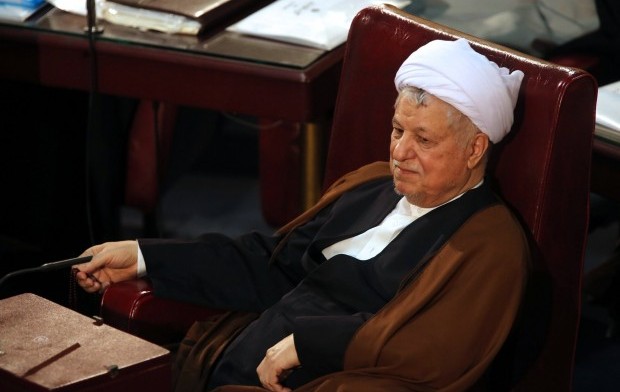
Former Iranian president Akbar Hashemi Rafsanjani attends a meeting of Iran’s Assembly of Experts in Tehran on March 5, 2013.(AFP PHOTO/ ATTA KENARE)
London, Asharq Al-Awsat—Iran’s influential former president Hashemi Rafsanjani is reported to have ruled himself out as a presidential candidate this week, as well as criticizing the “stubbornness of office holders whose deeds have put the country in this undesirable state” in a separate meeting with current and former MPs.
He also called on current officials to recognize the mistakes that have been made, and the critical situation currently faced by Iran.
Reports of Rafsanjani’s decision not to stand in Iran’s presidential election in June stem from an unconfirmed report by the pro-reformist website Saham News of a private meeting of former provincial governors and colleagues from his administration. Rafsanjani was quoted as saying that he had lost the trust of Iran’s supreme leader, Ayatollah Ali Khamenei, and that without this there was no point in becoming president in the first place.
Rafsanjani’s office, however, denied the reports and said that the quotes were “inaccurate.”
Hashemi Rafsanjani has been an integral power broker in the Islamic Republic of Iran since its birth in 1979, and was a prominent member of the powerful Revolutionary Council, appointed and trusted by the late Ayatollah Khomeini.
His extensive CV includes 2 terms speaker of parliament and deputy head of the armed forces on behalf of Ayatollah Khomeini during the 8 years of the Iraq-Iran War, two terms as president from 1989 to 1997, and nearly 20 years as head of Expediency Council. He also served as head of Council of Experts for four years, which, according to the constitution, appoints and supervises the position of supreme leader.
Until 2005 he was much praised by a majority of state officials within the executive, legislature and judicial branches of the Iranian government, described as a “pillar of the Islamic revolution,” and known by a famous quote from Ayatollah Khomeini following an assassination attempt in the early 1980s, which ran: “The [Islamic] movement is alive so long as Hashemi is alive.”
However, in more recent years rumours about his family and allies’ economic and financial privileges have damaged his public standing and provided a justification for his gradual exclusion from key policy making circles, beginning with the election of President Khatami in 1997. The arrival of Ahmadinejad in Iranian politics changed the equation even further, and led to the dramatic decline of Rafsanjani’s political influence.
He is well known for his belief in an open economic system and inclination towards detente in foreign policy. Throughout his time in office, Rafsanjani has shown his preference for technocratic economic policies and made attempts to normalise relations with the international community, in particular the Arab world and the West. This has led to criticism from conservatives, who have attempted to discredit him as a liberal and pragmatic politician with little loyalty to the underlying ideals of the Islamic Revolution.
This was, in fact, the central reason behind their decision to oppose him in the second round of the 2005 presidential election, when he lost a run-off to Mahmoud Ahmadinejad. Ahmadinejad’s image, in contrast, was that of a pure and corruption-free figure dedicated to upholding the principles and goals of the 1979 revolution.
Nonetheless, despite his combative image, Ahmadinejad’s tough stance against corruption and nepotism has proved to be a failure for the most part. Much to the disappointment of his supporters, they may now have to face the bitter irony that Rafsanjani’s skill at consensus-building makes him a desirable ally, given the current external pressures on Iran and internal mismanagement by the current administration. Though it appears that he will not running as a presidential candidate, some kind of alliance with Rafsanjani remains a possibility.
